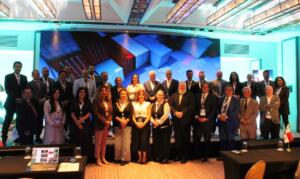
There is no professional who is closer to knowing the reality of ports than a maritime agent or shipping agent .
Representatives of this industry’s associations in Latin America and the United States met yesterday in Mexico City for their 21st Annual Meeting, where they did not hesitate to reveal the current issues at the region’s ports.
The body that brings together these associations is the Inter-American Chamber of National Associations of Shipping Agents (CIANAM) .
Although the challenges and difficulties faced by ports may be similar, each country faces a different economic, growth, and maritime development context, which undoubtedly affects the flow of international trade in various ways .
Here, we see situations such as a lack of investment in infrastructure to handle the entry and exit of goods, such as roads, port access, and equipped port terminals; as well as responsive customs and committed port authorities; and port operators with the capacity to handle each type of cargo.
The meeting presented the cases of Mexico, Panama, Brazil, Chile, Costa Rica, the United States, Argentina, Paraguay, Peru, Ecuador, and Uruguay , according to the agenda.
CIANAM is made up of the Navigation Center (Cenav, Argentina) , the National Federation of Maritime Navigation Agencies (Fenamar, Brazil) , the Maritime and Port Chamber of Chile (Camport) , the Costa Rican Chamber of Shipowners (Nave) , the Maritime Chamber of Ecuador (Camae) , the Association of Ship Brokers and Agents (ASBA, United States) , the Mexican Association of Shipping Agents (Amanac) , the Maritime Chamber of Panama , the Association of Shipping Agents of Paraguay (Asamar) , the Peruvian Association of Maritime Agents (APAM) and the Navigation Center (Uruguay) .
This regional chamber was founded in 2004 , after two years of work that began at the 2002 meeting of the Federation of National Associations of Brokers and Maritime Agents (Fonasba) .
On behalf of Mexico, the work was carried out by Miguel E. García, president of Amanac at the time. Since then, the country has actively supported CIANAM’s work . Today, Amanac is chaired by Fernando Con y Ledesma and directed by Miguel A. Andrade, who was also appointed vice president of the Chamber in 2023.
Mexico, host of the 21st Annual Meeting, has twice led CIANAM. In the last two years, it was led by Uruguayan Mónica Ageitos , whose term concludes this Friday. A new president is expected to be elected during the CIANAM meeting, which ends this Friday.
The objective of CIANAM is to promote the rights of maritime agents , transport and maritime trade in harmony with inter-American interests.
Undoubtedly, the latter could not be achieved without lobbying the various port authorities. This meeting in Mexico City was attended by Admiral José Barradas Cobos, Undersecretary of the Navy at the Ministry of the Navy , as well as by the head of the General Coordination of Ports and Merchant Marine, Captain Manuel Fernando Gutiérrez Gallardo; and by representatives from the Ministry of Economy (SE) , such as Alejandro Habib, Director of Business Integration Programs, and Citalli Navarro, Director General of Market Access for Goods.
The message these officials delivered focused on aligning Mexico’s maritime development strategy with the guidelines of the plan implemented by the administration of President Claudia Sheinbaum.
“During this six-year term, Mexico will not turn its back on the sea,” said Citlalli Navarro during her address, also highlighting that the federal government sees customs as “a great opportunity for national economic development, and that this will translate into the well-being of the Mexican population.”
The SE representative justified her comment by highlighting the fact that 30% of Mexico’s total gross revenue comes from the 50 customs offices , and half of this percentage is collected through the 17 maritime customs offices.
For his part, Fernando Con indicated that CIANAM intends to integrate the other Latin American countries in order to make the region more competitive with the rest of the world.
Also present at the meeting was Fulvio Carlini, president of Fonasba, who emphasized that America has the advantage of having three main languages spoken, mostly Spanish, which leads to better understanding and collaborative work at CIANAM .
And while the region’s ports face multiple challenges, they have also shown some progress in recent years that has increased their operational capacity, whether through new or improved facilities.
Comment and follow us on X: @EnriqueDuRio / @GrupoT21















